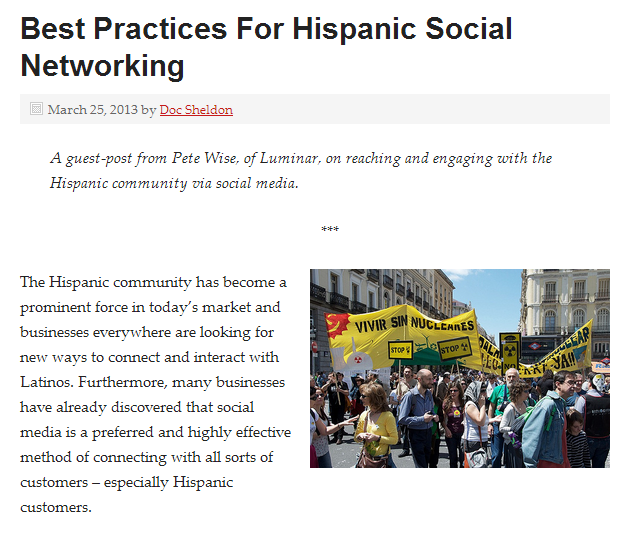Google surprised everyone when they seemingly penalized SEO professional Doc Sheldon’s entire website for one problematic guest post. Although Sheldon pointed out a full range of other possible reasons for the penalty in a lengthy open letter, Matt Cutts responded with just one specific example:
@DocSheldon what “Best Practices For Hispanic Social Networking” has to do with an SEO copywriting blog? Manual webspam notice was on point.
— Matt Cutts (@mattcutts) March 24, 2014
The SEO community’s reaction is mixed, but leaning more in Sheldon’s favor. A discussion on inbound.org even calls Cutts’ response “insane.”
Looking at the guest post in question, it’s easy to see why Google would have raised its eyebrows at it – it’s terrible. Even Sheldon himself admits “It wasn’t totally without value, but it didn’t bring much to the table.
The good news is the penalty was revoked less than five days after Sheldon sent in a reconsideration request. Even so, he still maintains: “It’s certainly true that the guest post in question wasn’t high quality – lesson learned there, for all of us.”
Many SEOs participating in the discussion agree that a site-wide penalty for one questionable guest post is a bit much, and the fact that it was revoked shows that perhaps Google feels the same way. But it still goes to show that you can never be too careful about the content you post on your site, especially if you’re on the publishing end of guest blogging.
This doesn’t mean you should stop accepting great contributions from industry experts. It just means you have to be extra careful when reviewing contributed content. Reverse engineering some of our tips on reaching out to content publishers can help you tighten your screening, editing, and approval process for contributed content.
Here are a few questions to help improve your guest post approval process when someone offers to contribute to your publication:
- Do you know this person? – It’s better to only accept contributed posts from people you actually know or have worked with before. Relationship building is the new link building, and those who know you and your brand well are usually the best candidates for guest posting.
- Is the message personalized? – Watch out for “template” messages. These indicate that the person asking to contribute on your blog is probably approaching a large number of publishers at the same time with the sole purpose of building links.
- Are they too self-centered? – Although potential contributors should at least introduce themselves when contacting you for the first time, they shouldn’t go on and on about their achievements and how lucky you are to hear from them. They should talk about how their contribution can provide useful information to your audience and add value to your publication.
- Are they published anywhere else? – A proper guest posting pitch should include a few examples of published work, if any. These existing publications can give you an idea how much value a post from the contributor can provide your audience.
- Do they provide real contact details and social media links? – This is a no-brainer question. Getting an email from so-and-so with an email address like “[email protected]” and a link to a fake social media account or a questionable website is never a good sign.
Guest blogging is not dead – it’s just evolved throughout the years. You don’t have to stop contributing or accepting guest posts, but you do have to rethink your entire purpose and approach to it. It should never be about the number of links you earn or manipulating search rankings in any way. It should be about sharing your knowledge and helping your readers (and your publishers, too).





